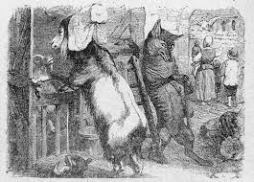This idiom translates directly into English as ‘to give the reply of a Norman’, which has the equivalent meaning of ‘to not give a straight answer’; being ambiguous or evasive when answering a question. A Norman here refers to inhabitants to a region in Northern France, Normandy.
Normandy has historically been economically heavily reliant on agriculture, hence the inhabitants will have been comprised predominantly of farmers, which means that the characteristics associated with the region of Normandy will have been based on the language, habits and behaviour of the farmers, with this idiom being just one example.
The idiom comes from the stereotype in French culture that there is a supposed unwillingness of Norman farmers to commit themselves; giving neither a yes or no answer. One of the possible origins of this idiom, explored by the German Walter Gottschalk in his book Die sprichwörtlichen redensarten der französischen sprache, translating as The proverbial sayings of the French language, is that in Normandy there was an ancient law which allowed anyone who signed a contract to retract within 24 hours. This could over time could have become the attitude of Normans not only to signing contracts but to any form of making an agreement; no sooner making an agreement than breaking it.
An example of a situation when this idiom could be used is:
“Il a fait une réponse de Normand en disant qu’il n’est ni pour ni contre.”
“He didn’t give a straight answer by saying he was neither for not against.”
Sources:
The Cambridge French-English Thesaurus
Collins- easy learning- French Idioms

